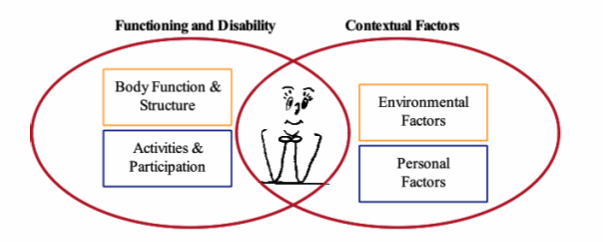PT 861 - Introduction to paediatric physiotherapy and typical development
Clinical frameworks for paediatric practice
- The International Classification of Functioning, Disability and Health (ICF) and Family-centred care (FCC) provide frameworks to guide assessment planning and intervention design to focus on the child's engagement and participation in activities of early learning. The ICF emphasizes participation rather than disability, providing a framework to relate impairments in body structure and function to limitations in participation and activity restrictions. FCC, in turn, recognizes the important role of the family and the community in supporting the full participation of children.
THE ICF


- The intent of the ICF is to determine how people can live with their health conditions and how people can be helped to achieve a productive and fulfilling life. More pointedly, the ICF provides a measure of what the person can actually do and the context in which it is done.

- The ICF therefore focuses the assessment on identifying the 'gap' between a person's capacity and actual performance, and understanding the role of the environment in either facilitating or impeding activities and participation.

Test your knowledge of the ICF. Determine if each of the following statements is true or false?
Body structure refers to the anatomical parts of the body and their components.
True False
Body function refers to the physiological functions of the body.
True False
Activity limitations refers to the difficulties a person experiences in performing age-appropriate tasks.
True False
Environmental factors include the attitudes of those with which a person conducts his or her life.
True False
Personal factors refer to the context of a person's life and living that are not part of a healthy condition or disorder.
True False
This document provides a summary description of the terms of the ICF.